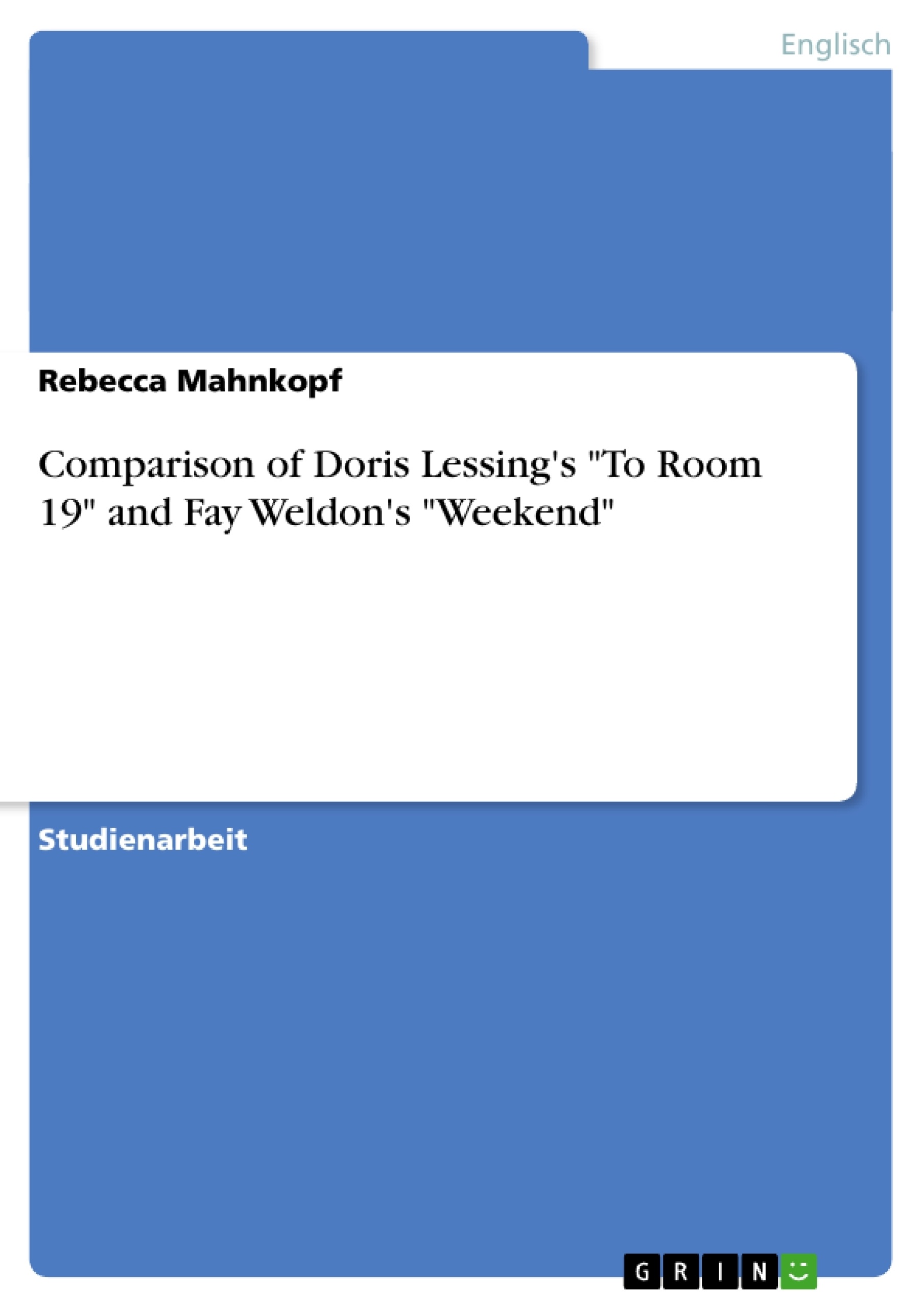The short stories “To Room 19” by Doris Lessing and “Weekend” by Fay Weldon present two dissimilar woman who have problems to handle their lives in their families.
As the quotation above shows, they have to take over a lot of different roles. This is sometimes very hard and demands a lot from the women.
In my research paper I analyse what the problems in these two families are and how they have arisen. Moreover I have a detailed look at the attempts the characters make in both stories to solve these problems. Of course I also take into my analysis some theoretical questions of narrative fiction. An extensive comparison of the results I have made in both stories makes up the end of my paper.
Inhaltsverzeichnis
- Einleitung
- Doris Lessing: „To Room 19“
- Charakterisierung von Susan und Matthew
- Ein Blick auf die Ehe der Rawlings
- Fay Weldon: „Weekend“
- Charakterisierung von Martha und Martin
- Ein Blick auf ihre Ehe
- Vergleich von „To Room 19“ und „Weekend“
- Ähnlichkeiten und Unterschiede zwischen den Hauptfiguren
- Thematischer Vergleich
- Vergleich der Erzählstimme und der Perspektive in beiden Geschichten
Zielsetzung und Themenschwerpunkte
Diese Arbeit analysiert die Probleme in den Familien der Protagonistinnen in Doris Lessings „To Room 19“ und Fay Weldons „Weekend“ und deren Lösungsversuche. Es wird untersucht, wie diese Probleme entstanden sind und welche narrativen Aspekte eine Rolle spielen. Ein ausführlicher Vergleich der Ergebnisse bildet den Abschluss der Arbeit.
- Probleme in ehelichen Beziehungen
- Rollenkonflikte von Frauen in der Familie und Beruf
- Analyse der Charaktere und deren Motivationen
- Vergleich der Erzählperspektiven
- Thematische Gemeinsamkeiten und Unterschiede beider Kurzgeschichten
Zusammenfassung der Kapitel
Einleitung: Die Einleitung stellt die beiden Kurzgeschichten „To Room 19“ von Doris Lessing und „Weekend“ von Fay Weldon vor, die sich mit den Problemen von Frauen auseinandersetzen, die versuchen, Familie und Leben unter einen Hut zu bringen. Die Arbeit kündigt die Analyse der Probleme, ihrer Entstehung und der Lösungsversuche der Protagonistinnen an, sowie eine Betrachtung narrativer Aspekte und einen Vergleich beider Geschichten an.
Doris Lessing: „To Room 19“: Dieses Kapitel analysiert die Charaktere Susan und Matthew Rawlings und ihre Ehe. Susan, Hausfrau mit vier Kindern, leidet unter einem Gefühl der Leere und sucht nach Einsamkeit und Anonymität in einem Hotelzimmer. Matthew, erfolgreicher Journalist, ist zwar äußerlich ein idealer Ehemann, zeigt aber emotionale Distanz und Untreue. Die Analyse beleuchtet die Diskrepanz zwischen dem scheinbar perfekten Familienbild und der tiefen Unzufriedenheit Susans, die letztlich in Selbstmord endet. Der Text untersucht, wie die mangelnde emotionale Kommunikation und das Unverständnis zwischen den Ehepartnern zur Eskalation der Krise beitragen.
Schlüsselwörter
„To Room 19“, „Weekend“, Eheprobleme, Rollenkonflikte, Frauen in der Familie, narrative Analyse, Charakterisierung, Vergleichende Literaturwissenschaft, emotionale Kommunikation, Selbstfindung, Existenzielle Krise.
Häufig gestellte Fragen zu "Analyse von Doris Lessings „To Room 19“ und Fay Weldons „Weekend“"
Was ist der Gegenstand dieser Arbeit?
Diese Arbeit analysiert die Probleme in den Familien der Protagonistinnen in Doris Lessings „To Room 19“ und Fay Weldons „Weekend“ und deren Lösungsversuche. Es wird untersucht, wie diese Probleme entstanden sind und welche narrativen Aspekte eine Rolle spielen. Ein ausführlicher Vergleich der Ergebnisse bildet den Abschluss der Arbeit.
Welche Themen werden behandelt?
Die Arbeit behandelt folgende Themen: Probleme in ehelichen Beziehungen, Rollenkonflikte von Frauen in Familie und Beruf, Analyse der Charaktere und deren Motivationen, Vergleich der Erzählperspektiven und thematische Gemeinsamkeiten und Unterschiede beider Kurzgeschichten.
Welche Kurzgeschichten werden verglichen?
Verglichen werden Doris Lessings „To Room 19“ und Fay Weldons „Weekend“.
Wie werden die Charaktere in „To Room 19“ beschrieben?
In „To Room 19“ werden Susan und Matthew Rawlings analysiert. Susan, eine Hausfrau mit vier Kindern, leidet unter einem Gefühl der Leere. Matthew, ein erfolgreicher Journalist, zeigt emotionale Distanz und Untreue. Die Analyse beleuchtet die Diskrepanz zwischen dem scheinbar perfekten Familienbild und Susans tiefer Unzufriedenheit, die letztlich in Selbstmord endet.
Wie werden die Charaktere in „Weekend“ beschrieben?
In Bezug auf "Weekend" wird die Charakterisierung von Martha und Martin und ihrer Ehe behandelt. Die genauen Details der Charakterisierung sind in dem gegebenen HTML-Auszug nicht explizit aufgeführt.
Was ist der Fokus des Vergleichs zwischen „To Room 19“ und „Weekend“?
Der Vergleich umfasst Ähnlichkeiten und Unterschiede zwischen den Hauptfiguren, einen thematischen Vergleich und einen Vergleich der Erzählstimme und der Perspektive in beiden Geschichten.
Welche narrativen Aspekte werden betrachtet?
Die Arbeit betrachtet die narrativen Aspekte im Kontext der Entstehung und Lösung der Probleme der Protagonistinnen. Die genauen narrativen Aspekte, die untersucht werden, sind nicht im Detail im Auszug spezifiziert, jedoch wird auf Erzählperspektive und -stimme eingegangen.
Welche Schlüsselwörter beschreiben die Arbeit?
Schlüsselwörter sind: „To Room 19“, „Weekend“, Eheprobleme, Rollenkonflikte, Frauen in der Familie, narrative Analyse, Charakterisierung, Vergleichende Literaturwissenschaft, emotionale Kommunikation, Selbstfindung, Existenzielle Krise.
Wie ist die Arbeit strukturiert?
Die Arbeit besteht aus einer Einleitung, Kapiteln zu „To Room 19“ und „Weekend“ (mit Unterkapiteln zur Charakterisierung und Analyse der Ehen), einem Vergleichskapitel und einem Fazit (implizit). Die Kapitelzusammenfassung im HTML gibt einen guten Überblick.
- Arbeit zitieren
- Rebecca Mahnkopf (Autor:in), 2003, Comparison of Doris Lessing's "To Room 19" and Fay Weldon's "Weekend", München, GRIN Verlag, https://www.grin.com/document/30677



